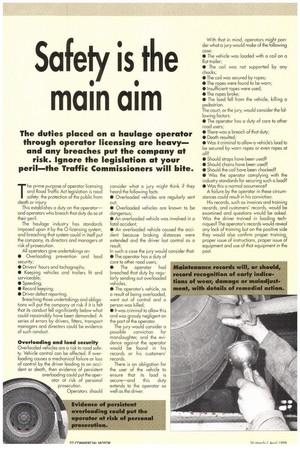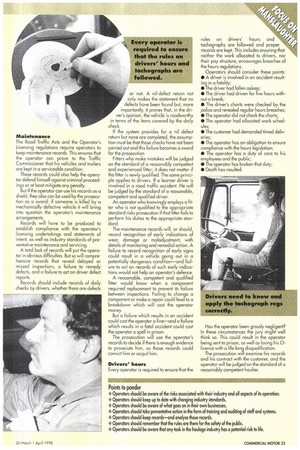Safety is the main aim
Page 24

Page 25

If you've noticed an error in this article please click here to report it so we can fix it.
The duties placed on a haulage operator through operator licensing are heavy— and any breaches put the company at risk. Ignore the legislation at your peril—the Traffic Commissioners will bite.
The prime purpose of operator licensing and Rood Traffic Act legislation is road safety: the protection of the public from death or injury.
This establishes a duty on the operator— and operators who breach that duty do so at their peril. The haulage industry has standards imposed upon it by the 0-licensing system, and breaching that system could in itself put the company, its directors and managers at risk of prosecution. All operators give undertakings on: • Overloading prevention and load security; • Drivers' hours and tachographs; • Keeping vehicles and trailers fit and serviceable; • Speeding; • Record keeping; • Driver defect reporting. Breaching those undertakings and obligations will put the company at risk if it is felt that its conduct fell significantly below what could reasonably have been demanded. A series of errors by drivers, fitters, transport managers and directors could be evidence of such conduct.
Overloading and load security Overloaded vehicles area risk to road safety. Vehicle control can be affected. If overloading causes a mechanical failure or loss of control by the driver leading to an accident or death, then evidence of [persistent
overloading could put the operator at risk of personal prosecution.
Operators should consider what a jury might think if they heard the following facts: • Overloaded vehicles are regularly sent out; • Overloaded vehicles are known to be dangerous; • An overloaded vehicle was involved in a fatal accident; • An overloaded vehicle caused the accident because braking distances were extended and the driver lost control as a result; In such a case the jury would consider that • The operator has a duty of care to other road users; • The operator had breached that duty by regularly sending out overloaded vehicles; • The operator's vehicle, as a result of being overloaded, went out of control and a person was killed; • It was criminal to allow this and was grossly negligent on the part of the operator. The jury would consider a possible conviction for manslaughter, and the evidence against the operator would be found in his records or his customers' records.
There is an obligation for the user of the vehicle to ensure that its load is secure—and this duty extends to the operator as well as the driver.
With that in mind, operators might ponder what a jury would make of the Following case:
• The vehicle was loaded with a coil on a flat trailer; • The coil was not supported by any chocks; • The coil was secured by ropes; • The ropes were found to be worn; • Insufficient ropes were used; • The ropes broke; • The load fell from the vehicle, killing a pedestrian.
The court, or the jury, would consider the following factors:
• The operator has a duty of care to other road users; • There was a breach of that duty; • Death resulted; • Was it criminal to allow a vehicle's load to be secured by worn ropes or even ropes at all?
• Should straps have been used? • Should chains have been used?
• Should the coil have been chocked?
• Was the operator complying with the industry standards for securing such a load? • Was this a normal occurrence?
A failure by the operator in these circumstances could result in his conviction.
His records, such as invoices and training records, and customers' records, would be examined and questions would be asked. Was the driver trained in loading techniques? The operator's records would reveal any lack of training but on the positive side they would also confirm proper training, proper issue of instructions, proper issue of equipment and use of that equipment in the past.
Maintenance
The Road Traffic Acts and the Operator's Licensing regulations require operators to keep maintenance records. This ensures that the operator can prove to the Traffic Commissioner that his vehicles and trailers are kept in a serviceable condition.
These records could also help the operator defend himself against criminal proceedings or at least mitigate any penalty. But if the operator can use his records as a shield, they also can be used by the prosecution as a sword: if someone is killed by a mechanically defective vehicle it will bring into question the operator's maintenance arrangements. Records will have to be produced to establish compliance with the operator's licensing undertakings and statements of intent, as well as industry standards of preventative maintenance and servicing. A total lack of records will put the operator in obvious difficulties. But so will comprehensive records that reveal delayed or missed inspections, a failure to remedy defects, and a failure to act on driver defect reports, Records should include records of daily checks by drivers, whether there are defects or not. A nil-defect return not only makes the statement that no defects have been found but, more importantly, it proves that, in the driver's opinion, the vehicle is roadworthy in terms of the items covered by the daily check.
If the system provides for a nil defect return but none are completed, the assumption must be that those checks have not been carried out and this failure becomes a sword for the prosecution Fitters who make mistakes will be judged on the standard of a reasonably competent and experienced fitter; it does not matter if the fitter is newly qualified. The same principle applies to drivers. If a learner driver is involved in a road traffic accident. He will be judged by the standard of a reasonable, competent and qualified driver. An operator who knowingly employs a fitter who is not qualified to the appropriate standard risks prosecution if that Filler fails to perform his duties to the appropriate standard.
The maintenance records will, or should, record recognition of early indications of wear, damage or maladjustment, with details of monitoring and remedial action. A failure to record recognition of early signs could result in a vehicle going out in a potentially dangerous condition—and failure to act on records of such early indications would not help an operator's defence. A reasonable, competent and qualified fitter would know when a component required replacement to prevent its failure between inspections. Failing to change a component or make a repair could lead to a breakdown which will cost the operator money. But a failure which results in an accident could cost the operator a fine—and a failure which results in a fatal accident could cost the operator a spell in prison. The prosecution will use the operator's records to decide if there is enough evidence to prosecute him, so those records could convict him or acquit him.
Drivers' hours
Every operator is required to ensure that the rules on drivers' hours and tachographs are followed and proper records are kept. This includes ensuring that neither the work allocated to drivers, nor their pay structure, encourages breaches of the hours regulations. Operators should consider these points: • A driver is involved in an accident resulting in a fatality; • The driver had fallen asleep; • The driver had driven for five hours without a break; • The driver's charts were checked by the police and revealed regular hours breaches; • The operator did not check the charts; • The operator had allocated work schedules; • The customer had demanded timed deliveries; • The operator has an obligation to ensure compliance with the hours legislation; • The operator has a duty of care to his employees and the public; • The operator has broken that duty; • Death has resulted.
Has the operator been grossly negligent? In these circumstances the jury might well think so. This could result in the operator being sent to prison, as well as losing his 0licence with a life-long disqualification.
The prosecution will examine his records and his contract with the customer, and the operator will be judged on the standard of a reasonably competent haulier.




































































































